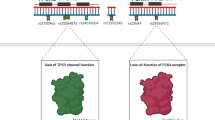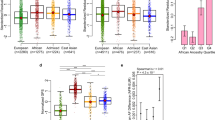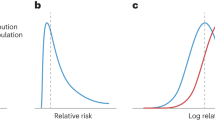Abstract
Host genetic factors are emerging as key determinants of disease risk for many cancers. Identifying candidate genes is a major challenge that has to stem from a profound understanding of the pathophysiology of the disease. The Toll-like receptors are important members of the host's innate immune response and their genes have been found to be polymorphic. This genetic variation allows for a more intricate repertoire that enables the host to withstand microbial challenges. While this may be advantageous on a population level, there may be less favourable outcomes for individuals that harbour certain genotypes associated with excessive immune activation and inflammatory drive. The damage is often collateral and is manifest in organs where this chronic inflammation alters normal physiology. A classic example of this paradigm is the Helicobacter pylori-induced gastric cancer model. Another emerging model is prostate cancer where Toll-like receptor polymorphisms have also been found to play a role. In this review, we discuss polymorphisms in Toll-like receptors and give an insight into how they may influence risk of cancer.
This is a preview of subscription content, access via your institution
Access options
Subscribe to this journal
Receive 50 print issues and online access
$259.00 per year
only $5.18 per issue
Buy this article
- Purchase on Springer Link
- Instant access to full article PDF
Prices may be subject to local taxes which are calculated during checkout
Similar content being viewed by others
References
Arbour NC, Lorenz E, Schutte BC, Zabner J, Kline JN, Jones M et al. (2000). TLR4 mutations are associated with endotoxin hyporesponsiveness in humans. Nat Genet 25: 187–191.
Backhed F, Rokbi B, Torstensson E, Zhao Y, Nilsson C, Seguin D et al. (2003). Gastric mucosal recognition of Helicobacter pylori is independent of Toll-like receptor 4. J Infect Dis 187: 829–836.
Berghofer B, Frommer T, Konig IR, Ziegler A, Chakraborty T, Bein G et al. (2005). Common human Toll-like receptor 9 polymorphisms and haplotypes: association with atopy and functional relevance. Clin Exp Allergy 35: 1147–1154.
Bochud PY, Hersberger M, Taffe P, Bochud M, Stein CM, Rodrigues SD et al. (2007). Polymorphisms in Toll-like receptor 9 influence the clinical course of HIV-1 infection. Aids 21: 441–446.
Collins FS, Green ED, Guttmacher AE, Guyer MS . (2003). A vision for the future of genomics research. Nature 422: 835–847.
De Marzo AM, Marchi VL, Epstein JI, Nelson WG . (1999). Proliferative inflammatory atrophy of the prostate: implications for prostatic carcinogenesis. Am J Pathol 155: 1985–1992.
De Marzo AM, Meeker AK, Zha S, Luo J, Nakayama M, Platz EA et al. (2003). Human prostate cancer precursors and pathobiology. Urology 62: 55–62.
De Marzo AM, Platz EA, Sutcliffe S, Xu JF, Gronberg H, Drake CG et al. (2007). Inflammation in prostate carcinogenesis. Nat Rev Cancer 7: 256–269.
Eder W, Klimecki W, Yu LZ, von Mutius E, Riedler J, Braun-Fahrlander C et al. (2004). Toll-like receptor 2 as a major gene for asthma in children of European farmers. J Allergy Clin Immunol 113: 482–488.
El-Omar EM . (2006). Role of host genes in sporadic gastric cancer. Best Pract Res Clin Gastroenterol 20: 675–686.
El-Omar EM, Carrington M, Chow WH, McColl KE, Bream JH, Young HA et al. (2000). Interleukin-1 polymorphisms associated with increased risk of gastric cancer. Nature 404: 398–402.
El-Omar EM, Oien K, El Nujumi A, Gillen D, Wirz A, Dahill S et al. (1997). Helicobacter pylori infection and chronic gastric acid hyposecretion. Gastroenterology 113: 15–24.
El-Omar EM, Penman ID, Ardill JE, Chittajallu RS, Howie C, McColl KE . (1995). Helicobacter pylori infection and abnormalities of acid secretion in patients with duodenal ulcer disease. Gastroenterology 109: 681–691.
El-Omar EM, Rabkin CS, Gammon MD, Vaughan TL, Risch HA, Schoenberg JB et al. (2003). Increased risk of noncardia gastric cancer associated with proinflammatory cytokine gene polymorphisms. Gastroenterology 124: 1193–1201.
Franchimont D, Vermeire S, El Housni H, Pierik M, Van Steen K, Gustot T et al. (2004). The toll-like receptor (TLR)-4 Asp299gly polymorphism is associated with Crohn's disease and ulcerative colitis. Gut 53: 987–992.
Hamann L, Gomma A, Schroder NWJ, Stamme C, Glaeser C, Schulz S et al. (2005). A frequent toll-like receptor (TLR)-2 polymorphism is a risk factor for coronary restenosis. J Mol Med 83: 478–485.
Hansson LE, Nyren O, Hsing AW, Bergstrom R, Josefsson S, Chow WH et al. (1996). The risk of stomach cancer in patients with gastric or duodenal ulcer disease. N Engl J Med 335: 242–249.
Hawn TR, Misch EA, Dunstan SJ, Thwaites GE, Lans NTN, Quy HT et al. (2007). A common human TLR1 polymorphism regulates the innate immune response to lipopeptides. Eur J Immunol 37: 2280–2289.
Hawn TR, Verbon A, Lettinga KD, Zhao LP, Li SS, Laws RJ et al. (2003). A common dominant TLR5 stop codon polymorphism abolishes flagellin signaling and is associated with susceptibility to legionnaires' disease. J Exp Med 198: 1563–1572.
Hawn TR, Wu H, Grossman JM, Hahn BH, Tsao BP, Aderem A . (2005). A stop codon polymorphism of Toll-like receptor 5 is associated with resistance to systemic lupus erythematosus. Proc Natl Acad Sci USA 102: 10593–10597.
Higgins SC, Lavelle EC, McCann C, Keogh B, McNeela E, Byrne P et al. (2003). Toll-like receptor 4-mediated innate IL-10 activates antigen-specific regulatory T cells and confers resistance to Bordetella pertussis by inhibiting inflammatory pathology. J Immunol 171: 3119–3127.
Hold GL, Rabkin CS, Chow WH, Smith MG, Gammon MD, Risch HA et al. (2007). A functional polymorphism of toll-like receptor 4 gene increases risk of gastric carcinoma and its precursors. Gastroenterology 132: 905–912.
Janeway Jr CA, Medzhitov R . (2002). Innate immune recognition. Annu Rev Immunol 20: 197–216.
Jelavic TB, Barisic M, Hofman ID, Boraska V, Vrdoljak E, Peruzovic M et al. (2006). Microsatelite GT polymorphism in the toll-like receptor 2 is associated with colorectal cancer. Clin Genet 70: 156–160.
Jemal A, Murray T, Ward E, Samuels A, Tiwari RC, Ghafoor A et al. (2005). Cancer statistics, 2005. Ca Cancer J Clin 55: 10–30.
Kang TJ, Chae GT . (2001). Detection of Toll-like receptor 2 (TLR2) mutation in the lepromatous leprosy patients. Fems Immunol Med Microbiol 31: 53–58.
Kawahara T, Kuwano Y, Teshima-Kondo S, Sugiyama T, Kawai T, Nikawa T et al. (2001a). Helicobacter pylori lipopolysaccharide from type I, but not type II strains, stimulates apoptosis of cultured gastric mucosal cells. J Med Invest 48: 167–174.
Kawahara T, Teshima S, Oka A, Sugiyama T, Kishi K, Rokutan K . (2001b). Type I Helicobacter pylori lipopolysaccharide stimulates toll-like receptor 4 and activates mitogen oxidase 1 in gastric pit cells. Infect Immun 69: 4382–4389.
Kiechl S, Lorenz E, Reindl M, Wiedermann CJ, Oberhollenzer F, Bonora E et al. (2002). Toll-like receptor 4 polymorphisms and atherogenesis. N Engl J Med 347: 185–192.
Kutukculer N, Yeniay BS, Aksu G, Berdeli A . (2007). Arg753Gln polymorphism of the human toll-like receptor-2 gene in children with recurrent febrile infections. Biochem Genet 45: 507–514.
Lazarus R, Klimecki WT, Raby BA, Vercelli D, Palmer LJ, Kwiatkowski DJ et al. (2003). Single-nucleotide polymorphisms in the Toll-like receptor 9 gene (TLR9): frequencies, pairwise linkage disequilibrium, and haplotypes in three US ethnic groups and exploratory case-control disease association studies. Genomics 81: 85–91.
Lazarus R, Raby BA, Lange C, Silverman EK, Kwiatkowski DJ, Vercelli D et al. (2004). TOLL-like receptor 10 genetic variation is associated with asthma in two independent samples. Am J Respir Crit Care Med 170: 594–600.
Lazarus R, Vercelli D, Palmer LJ, Klimecki WJ, Silverman EK, Richter B et al. (2002). Single nucleotide polymorphisms in innate immunity genes: abundant variation and potential role in complex human disease. Immunol Rev 190: 9–25.
Lorenz E, Frees KL, Schwartz DA . (2001). Determination of the TLR4 genotype using allele-specific PCR. Biotechniques 31: 22–24.
Lorenz E, Mira JP, Frees KL, Schwartz DA . (2002). Relevance of mutations in the TLR4 receptor in patients with gram-negative septic shock. Arch Intern Med 162: 1028–1032.
Macarthur M, Hold GL, El-Omar EM . (2004). Inflammation and Cancer II. Role of chronic inflammation and cytokine gene polymorphisms in the pathogenesis of gastrointestinal malignancy. Am J Physiol Gastrointest Liver Physiol 286: G515–G520.
Machado JC, Figueiredo C, Canedo P, Pharoah P, Carvalho R, Nabais S et al. (2003). A proinflammatory genetic profile increases the risk for chronic atrophic gastritis and gastric carcinoma. Gastroenterology 125: 364–371.
Mandell L, Moran AP, Cocchiarella A, Houghton J, Taylor N, Fox JG et al. (2004). Intact gram-negative Helicobacter pylori, Helicobacter felis, and Helicobacter hepaticus bacteria activate innate immunity via toll-like receptor 2 but not toll-like receptor 4. Infect Immun 72: 6446–6454.
Mockenhaupt FP, Cramer JP, Hamann L, Stegemann MS, Eckert J, Oh NR et al. (2006). Toll-like receptor (TLR) polymorphisms in African children: common TLR-4 variants predispose to severe malaria. Proc Natl Acad Sci USA 103: 177–182.
Parkin DM, Bray F, Ferlay J, Pisani P . (2005). Global cancer statistics, 2002. CA Cancer J Clin 55: 74–108.
Pasare C, Medzhitov R . (2005). Toll-like receptors: linking innate and adaptive immunity. Adv Exp Med Biol 560: 11–18.
Peek Jr RM, Blaser MJ . (2002). Helicobacter pylori and gastrointestinal tract adenocarcinomas. Nat Rev Cancer 2: 28–37.
Pierik M, Joossens S, Van Steen K, Van Schuerbeek N, Vlietinck R, Rutgeerts P et al. (2006). Toll-like receptor-1, -2, and -6 polymorphisms influence disease extension in inflammatory bowel diseases. Inflamm Bowel Dis 12: 1–8.
Pirie FJ, Pegoraro R, Motala AA, Rauff S, Rom L, Govender T et al. (2005). Toll-like receptor 3 gene polymorphisms in South African Blacks with type 1 diabetes. Tissue Antigens 66: 125–130.
Risch NJ . (2000). Searching for genetic determinants in the new millennium. Nature 405: 847–856.
Sanduleanu S, Jonkers D, De Bruine A, Hameeteman W, Stockbrugger RW . (2001). Double gastric infection with Helicobacter pylori and non-Helicobacter pylori bacteria during acid-suppressive therapy: increase of pro-inflammatory cytokines and development of atrophic gastritis. Aliment Pharmacol Ther 15: 1163–1175.
Schmausser B, Andrulis M, Endrich S, Lee SK, Josenhans C, Muller-Hermelink HK et al. (2004). Expression and subcellular distribution of toll-like receptors TLR4, TLR5 and TLR9 on the gastric epithelium in Helicobacter pylori infection. Clin Exp Immunol 136: 521–526.
Schroder NW, Schumann RR . (2005). Single nucleotide polymorphisms of Toll-like receptors and susceptibility to infectious disease. Lancet Infect Dis 5: 156–164.
Schroder NWJ, Hermann C, Hamann L, Gobel UB, Hartung T, Schumann RR . (2003). High frequency of polymorphism Arg753Gln of the Toll-like receptor-2 gene detected by a novel allele-specific PCR. J Mol Med 81: 368–372.
Segal ED, Lange C, Covacci A, Tompkins LS, Falkow S . (1997). Induction of host signal transduction pathways by Helicobacter pylori. Proc.. Proc Natl Acad Sci USA 94: 7595–7599.
Smith Jr MF, Mitchell A, Li G, Ding S, Fitzmaurice AM, Ryan K et al. (2003). Toll-like receptor (TLR) 2 and TLR5, but not TLR4, are required for Helicobacter pylori-induced NF-kappa B activation and chemokine expression by epithelial cells. J Biol Chem 278: 32552–32560.
Su B, Ceponis PJ, Lebel S, Huynh H, Sherman PM . (2003). Helicobacter pylori activates Toll-like receptor 4 expression in gastrointestinal epithelial cells. Infect Immun 71: 3496–3502.
Suerbaum S, Michetti P . (2002). Helicobacter pylori infection. N Engl J Med 347: 1175–1186.
Sun J, Wiklund F, Zheng SL, Chang B, Balter K, Li L et al. (2005). Sequence variants in Toll-like receptor gene cluster (TLR6-TLR1-1210912) and prostate cancer risk. J Natl Cancer Inst 97: 525–532.
Takeda K, Akira S . (2005). Toll-like receptors in innate immunity. Int Immunol 17: 1–14.
Tantisira K, Klimecki WT, Lazarus R, Palmer LJ, Raby BA, Kwiatkowski DJ et al. (2004). Toll-like receptor 6 gene (TLR6): single-nucleotide polymorphism frequencies and preliminary association with the diagnosis of asthma. Genes Immun 5: 343–346.
Viala J, Chaput C, Boneca IG, Cardona A, Girardin SE, Moran AP et al. (2004). Nod1 responds to peptidoglycan delivered by the Helicobacter pylori cag pathogenicity island. Nat Immunol 5: 1166–1174.
Yang IA, Barton SJ, Rorke S, Cakebread JA, Keith TP, Clough JB et al. (2004). Toll-like receptor 4 polymorphism and severity of atopy in asthmatics. Genes Immun 5: 41–45.
Zavros Y, Rieder G, Ferguson A, Samuelson LC, Merchant JL . (2002). Genetic or chemical hypochlorhydria is associated with inflammation that modulates parietal and G-cell populations in mice. Gastroenterology 122: 119–133.
Zheng SL, Augustsson-Balter K, Chang B, Hedelin M, Li L, Adami HO et al. (2004). Sequence variants of toll-like receptor 4 are associated with prostate cancer risk: results from the CAncer Prostate in Sweden Study. Cancer Res 64: 2918–2922.
Zhou XX, Jia WH, Shen GP, Qin HD, Yu XJ, Chen LZ et al. (2006). Sequence variants in toll-like receptor 10 are associated with nasopharyngeal carcinoma risk. Cancer Epidemiol Biomarkers Prev 15: 862–866.
Author information
Authors and Affiliations
Corresponding author
Rights and permissions
About this article
Cite this article
El-Omar, E., Ng, M. & Hold, G. Polymorphisms in Toll-like receptor genes and risk of cancer. Oncogene 27, 244–252 (2008). https://doi.org/10.1038/sj.onc.1210912
Published:
Issue Date:
DOI: https://doi.org/10.1038/sj.onc.1210912
Keywords
This article is cited by
-
Genetic variation in toll-like receptor 4 gene with primary antiphospholipid syndrome susceptibility: a cohort of Egyptian patients
Egyptian Journal of Medical Human Genetics (2022)
-
In Silico Design and Immunological Studies of Two Novel Multiepitope DNA-Based Vaccine Candidates Against High-Risk Human Papillomaviruses
Molecular Biotechnology (2021)
-
oipA “on” status of Helicobacter pylori is associated with gastric cancer in North-Eastern Brazil
BMC Cancer (2019)
-
RETRACTED ARTICLE: Impact of Toll-Like Receptors 2/3/4/9, IL-1-α/β and TNF-α Polymorphisms in Cervical Cancer Susceptibility in Tunisia
Pathology & Oncology Research (2018)
-
TLR4 Polymorphisms and Expression in Solid Cancers
Molecular Diagnosis & Therapy (2018)



